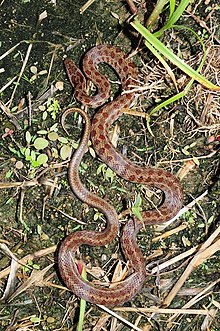| Steppe rat snake | |
|---|---|

| |
| Conservation status | |
 Least Concern (IUCN 3.1) | |
| Scientific classification | |
| Domain: | Eukaryota |
| Kingdom: | Animalia |
| Phylum: | Chordata |
| Class: | Reptilia |
| Order: | Squamata |
| Suborder: | Serpentes |
| Family: | Colubridae |
| Genus: | Elaphe |
| Species: | E. dione |
| Binomial name | |
| Elaphe dione (Pallas, 1773) | |
| Synonyms | |
| |
Elaphe dione, commonly known as Dione's rat snake, the steppe rat snake, or the steppes rat snake, is a species of snake in the family Colubridae. The species is native to Asia and Eastern Europe. There are no subspecies that are recognized as being valid. A large specimen from Putyatin Island measured up to 90 cm (3.0 ft) in length.
Etymology
The specific name, dione, refers to the Greek mythological figure Dione who was the mother of Aphrodite.
Habitat
E. dione is found in eastern Ukraine, southern and southeastern Russia, Central Asia, Iran, Afghanistan, Mongolia, parts of China, and Korea. It is found in a wide variety of habitats including forest, shrubland, grassland, rocky areas, desert, freshwater wetlands, and disturbed areas, at altitudes from sea level to 3,580 m (2.22 mi).
Behavior
An adult female mates with two or more males, sometimes copulating with two males at the same time. E. dione is oviparous, and adult females lay a clutch of 3–15 eggs in July or August, though some can lay a clutch of up to 24 eggs.
References
- ^ Aghasyan, A.; Avci, A.; Tuniyev, B.; Crnobrnja-Isailovic, J.; Lymberakis, P.; Andrén, C.; Cogalniceanu, D.; Wilkinson, J.; Ananjeva, N.B.; Üzüm, N.; Orlov, N.L.; Podloucky, R.; Tuniyev, S.; Kaya, U.; Li, P.; Borkin, L.; Milto, K.; Golynsky, E.; Rustamov, A.; Nuridjanov, D.; Munkhbayar, K.; Shestapol, A. (2017). "Elaphe dione". IUCN Red List of Threatened Species. 2017: e.T157275A747623. doi:10.2305/IUCN.UK.2017-2.RLTS.T157275A747623.en. Retrieved 19 November 2021.
- ^ Elaphe dione at the Reptarium.cz Reptile Database
- Ratnikov, V. (2022). "Comparative Osteology of Two Far Eastern Species of Ratsnakes (Serpentes: Colubridae), Elaphe dione (Pallas, 1773) and E. schrenckii (Strauch, 1873), for the Purpose of Palaeontological Studies". Asian Herpetological Research. 13 (1): 1–22. doi:10.16373/j.cnki.ahr.210021.
- Beolens, Bo; Watkins, Michael; Grayson, Michael (2011). The Eponym Dictionary of Reptiles. Baltimore: Johns Hopkins University Press. xiii + 296 pp. ISBN 978-1-4214-0135-5. (Elaphe dione, p. 73).
- Do, M.S.; Choi, J.H.; Lee, H.-T.; Lee, S.-C. (2004). "Mating System and Behavior of Steppe Rat Snake (Elaphe dione) in South Korea". Russian Journal of Herpetology. 31 (1): 56–59. doi:10.30906/1026-2296-2024-31-1-56-59.
- Pokhilyuk, Nikita E. (2022). "Notes on Captive Breeding of Three Snake Species (Colubridae) from the Russian Far East". Jordan Journal of Natural History. 9 (1): 19–23.
Further reading
- Boulenger GA (1894). Catalogue of the Snakes in the British Museum (Natural History). Volume II., Containing the Conclusion of the Colubridæ Aglyphæ. London: Trustees of the British Museum (Natural History). (Taylor and Francis, printers). xi + 382 pp. + Plates I-XX. (Coluber dione, pp. 44–45). doi:10.5962/bhl.title.8316
- Pallas PS (1773). Reise durch verschiedenen Provinzen des Russischen Reichs, Zweiter Theil. . Saint Petersburg: Kaiserlichen Akademie der Wissenschaften. 744 pp. (Coluber dione, new species, p. 717). (in German and Latin).
- Shannon FA (1956). "The Reptiles and Amphibians of Korea". Herpetologica 12 (1): 22–49. JSTOR 3889565
- Stejneger L (1907). Herpetology of Japan and Adjacent Territory. United States National Museum Bulletin 58. Washington, District of Columbia: Smithsonian Institution. xx + 577 pp. (Elaphe dione, new combination, pp. 315–318, Figure 272).
This article relating to Colubrinae is a stub. You can help Misplaced Pages by expanding it. |
- IUCN Red List least concern species
- Elaphe
- Snakes of Asia
- Reptiles of Central Asia
- Reptiles of the Middle East
- Reptiles of Europe
- Reptiles of Afghanistan
- Snakes of China
- Reptiles of Iran
- Reptiles of Korea
- Reptiles of Mongolia
- Reptiles of Russia
- Taxa named by Peter Simon Pallas
- Reptiles described in 1773
- Colubrinae stubs